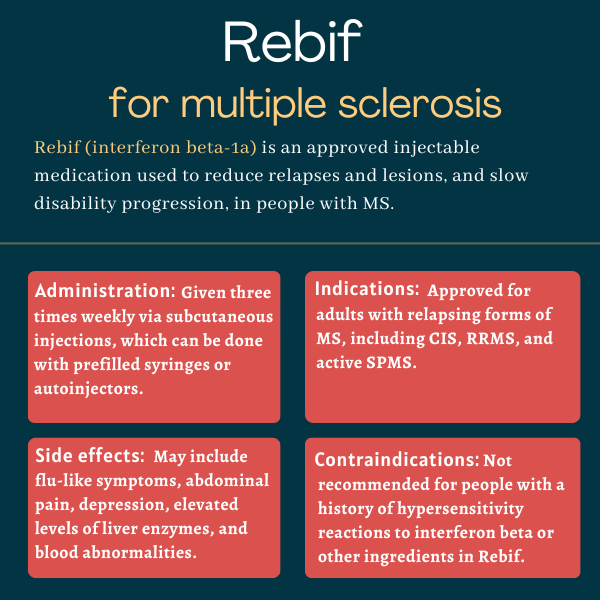
FAQs about Rebif
Rebif was approved by the U.S. Food and Drug Administration (FDA) in March 2002 for the treatment of relapsing forms of multiple sclerosis (MS), including clinically isolated syndrome, relapsing-remitting MS, and active secondary progressive MS. However, the active ingredient in Rebif, interferon beta-1a, was originally approved by the FDA in 1996 under the brand name Avonex.
A large pregnancy registry that tracked the outcomes of nearly 800 pregnancies exposed to interferon beta therapies, including Rebif, did not identify an increased risk of major birth defects or adverse pregnancy outcomes. Exposure to this therapy during the second and third trimesters of pregnancy has not been well studied, however. If clinically needed, Rebif may be considered for use during pregnancy, but patients who are or plan to become pregnant should discuss the benefits and risks of continuing to receive treatment with their healthcare team.
No interactions between Rebif and alcohol have been described to date. Drinking alcohol, however, can potentially worsen some side effects, including liver damage, associated with this therapy. Rebif should be used with caution in patients with liver disease or a history of alcohol abuse, according to its label. Patients should talk with their healthcare provider to understand how much alcohol is safe for them to drink while on this medication.
Some patients in clinical trials have seen results from Rebif within six months of starting treatment. Nonetheless, multiple sclerosis is a disease that can look very different in different people, and it is recommended that patients talk with their healthcare team about how Rebif may help in their particular case.
Based on clinical trials and studies done after Rebif’s approval, hair loss is considered a common side effect of this treatment. Although more rare, weight gain also may occur as a result of kidney problems brought on by the therapy. Patients should talk with their healthcare providers if such events occur while taking Rebif.
 Fact-checked by
Fact-checked by 


